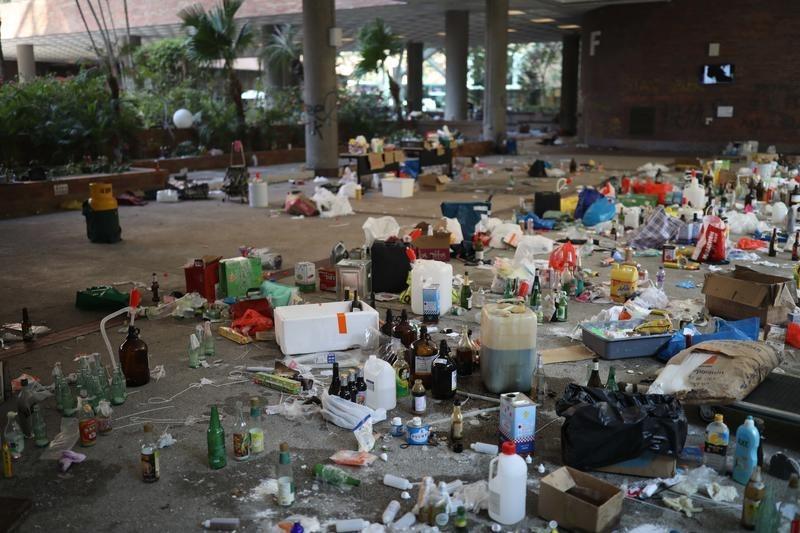Radicals' actions at CUHK, PolyU offer harsh lessons to their enablers
By Paul Yeung | Xinhua | Updated: 2019-11-21 13:40

The battles on two main campuses over the past two weeks are heartbreaking to Hong Kong people. The confrontation that happened at the Chinese University of Hong Kong (CUHK) did arouse public concern as it was the first confrontation inside a university campus. Just when people were relieved to hear last week that the crisis inside CUHK was settled, the battlefield rapidly shifted to the Hong Kong Polytechnic University (PolyU) campus and led to another terrible crisis this week.
The police's tactics have been under the spotlight. But it is the actions of the radical protesters that should be noted. Many people have found themselves trapped in a mental dilemma: They don't want the campus to be ruined nor any youngsters to be arrested, worrying that they are too young to face jail. However, the sympathizers of the radical protesters should not overlook the fact that they are conducting unlawful acts, and that the police force needs to safeguard public order. There are lessons to be learned from the confrontations inside the campuses.
First, the antigovernment campaign has been hijacked by the radical protesters. It has emerged that most of the radical protesters who previously occupied CUHK are not students of the university. This was exposed when two groups of protesters quarreled because of divided views on their "protest" strategy inside the campus. Those radical protesters from outside intended to turn the university campus into an operational base, from where they would sustain their fight against the government. They tried to deceive the public that they were all students, and hoped that the police would refrain from entering the campus for fear of a public backlash.
The radicals were taking advantage of university campuses to develop their "revolution" bases. The public, especially the students, should never tolerate such plots. The occupation of the CUHK campus by outsiders has led to severe destruction to the campus facilities, especially the trees; real CUHK students would not have done that. The students should have learned a lesson from the CUHK occupation. Unfortunately, they didn't, and the tragedy was repeated at PolyU.
Obviously, the radicals were taking advantage of university campuses to develop their "revolution" bases. The public, especially the students, should never tolerate such plots. The occupation of the CUHK campus by outsiders has led to severe destruction to the campus facilities, especially the trees; real CUHK students would not have done that. The students should have learned a lesson from the CUHK occupation. Unfortunately, they didn't, and the tragedy was repeated at PolyU.
The second lesson concerns the role of the teachers of the young protesters. Those teachers were worried about their students who were in a dangerous situation during the campus crisis. Their attempts to protect the students are understandable. But they cannot shirk their responsibilities. They have either failed to teach their students how to express their political views in a peaceful and lawful manner, or have condoned their radical actions. The teachers have also failed to pull their students back when the latter went too far. In fact, some of those teachers, who also play the role of public intellectuals, even tried to justify the radical actions of the students. When the crisis at CUHK happened, they only added fuel to the fire by supporting the radicals and condemning the police action. Their actions contributed to the crisis at PolyU.
The third lesson should be learned by the moderate protesters. They share similar values with those radicals, but they are wise enough to keep their distance from violence. They are sad about the campus crisis. But they can do more than merely being sad. They should realize, after the CUHK occupation, that radical actions could be disastrous. After the CUHK crisis, they should have persuaded the radical protesters not to go to PolyU. Unfortunately, some of those moderate protesters have chosen to encourage the radicals by posting "acknowledgments" on social media.
The recent violent rampages have set off alarm bells. Months ago, there was a warning that extremism was emerging in Hong Kong; few took it seriously. The public now realizes: The escalating violence is borderline terrorism. Philosopher Georg Hegel warned us, "What experience and history teach is this - we have never learned anything from history or acted upon any lessons they might have drawn from it." If we don't take the lessons quickly, we don't know which campus will become the next battlefield. The author is research officer of the One Country Two Systems Research Institute.























